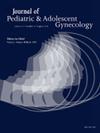37. Examining contraceptive knowledge, use and preferences of adolescents hospitalized with psychiatric disorders
IF 1.8
4区 医学
Q3 OBSTETRICS & GYNECOLOGY
引用次数: 0
Abstract
Background
Adolescents with psychiatric symptoms have unique sexual health needs. These adolescents can have younger age at first sex, less frequent and/or inconsistent contraception use, and higher risk sexual behaviors than their peers without psychiatric symptoms. We examined contraception knowledge, use, and preferences among adolescents assigned female at birth (AFAB) hospitalized for psychiatric care, in addition to patient factors associated with contraceptive use.
Methods
Between November 2021 and March 2023, we recruited 451 adolescents AFAB ages 14-17 from 4 inpatient psychiatric units at a large children's hospital. As part of a larger study examining integration of contraception care in inpatient psychiatric settings, participants answered a survey about reproductive health, mental health, contraception knowledge, use, and preferences. The survey was administered via an electronic tablet using REDCap. Participants received a gift card incentive. Descriptive statistics included mean and standard deviation (SD) for continuous variables and frequencies and percentages for categorical variables. We used logistic regression to examine characteristics associated with contraception use. This study was approved by the institutional review board.
Results
Mean age was 16.1 (95% CI: 14.1-18.1); 65.4% identified as white and 9.3% identified as Hispanic. Most respondents reported knowledge about the contraceptive pill (98.9%), implant (76.1%), intrauterine device (IUD; 75.2%), and injectable (51.4%). Among the 44.6% of respondents that reported ever having intercourse, condoms (49.3%), withdrawal (29.4%) and contraceptive pills (23.4%) were the most common methods of contraception. Some (37.3%) reported using multiple methods and few (13.4%) reported using no method to prevent pregnancy. When asked to select their preferred method, participants chose contraceptive pills (38.6%) most, followed by the implant (16.0%) and IUD (11.3%). Age was significantly associated with contraceptive use (OR: 1.6; 95% confidence interval 1.3, 1.9; p< 0.001) with older adolescents reporting higher odds of contraceptive use. Patient race, experience with sexual education, and insurance status were not significantly associated with contraceptive use.
Conclusions
Many adolescents hospitalized with psychiatric disorders are sexually active. Despite knowledge of contraceptives and preferences for more effective methods, their use of condoms and withdrawal may indicate their contraceptive needs are not being met. As adolescents face increasing rates of psychiatric symptoms, effort is recommended to ensure they have accessible sexual health services.
37. 调查精神疾病住院青少年的避孕知识、使用和偏好
有精神症状的青少年有独特的性健康需求。与没有精神症状的同龄人相比,这些青少年发生第一次性行为的年龄更小,使用避孕措施的频率和/或不一致,性行为的危险性更高。除了与避孕使用相关的患者因素外,我们还调查了住院接受精神科治疗的出生时被指定为女性的青少年(AFAB)的避孕知识、使用和偏好。方法:在2021年11月至2023年3月期间,我们从一家大型儿童医院的4个住院精神科招募了451名年龄在14-17岁的AFAB青少年。作为一项大型研究的一部分,研究了住院精神病患者的避孕护理整合,参与者回答了一项关于生殖健康、心理健康、避孕知识、使用和偏好的调查。该调查通过使用REDCap的电子平板电脑进行。参与者获得了礼品卡奖励。描述性统计包括连续变量的均值和标准差(SD),分类变量的频率和百分比。我们使用逻辑回归来检验与避孕使用相关的特征。这项研究得到了机构审查委员会的批准。结果平均年龄为16.1岁(95% CI: 14.1 ~ 18.1);65.4%为白人,9.3%为西班牙裔。大多数受访者表示对避孕药(98.9%)、植入物(76.1%)、宫内节育器(IUD;75.2%)和可注射(51.4%)。在有过性行为的44.6%的受访者中,安全套(49.3%)、停药(29.4%)和避孕药(23.4%)是最常见的避孕方法。部分(37.3%)报告使用多种方法预防妊娠,少数(13.4%)报告不使用任何方法预防妊娠。当被问及首选避孕方法时,参与者选择避孕药最多(38.6%),其次是植入物(16.0%)和宫内节育器(11.3%)。年龄与避孕药具使用显著相关(OR: 1.6;95%置信区间1.3,1.9;术中;0.001),年龄较大的青少年报告使用避孕药具的几率更高。患者种族、性教育经历和保险状况与避孕药具使用无显著相关。结论许多住院的青少年精神障碍患者性行为活跃。尽管他们了解避孕药具,并偏好更有效的方法,但他们使用避孕套和退出避孕可能表明他们的避孕需求没有得到满足。由于青少年面临越来越多的精神症状,建议努力确保他们获得可获得的性健康服务。
本文章由计算机程序翻译,如有差异,请以英文原文为准。
求助全文
约1分钟内获得全文
求助全文
来源期刊
CiteScore
3.90
自引率
11.10%
发文量
251
审稿时长
57 days
期刊介绍:
Journal of Pediatric and Adolescent Gynecology includes all aspects of clinical and basic science research in pediatric and adolescent gynecology. The Journal draws on expertise from a variety of disciplines including pediatrics, obstetrics and gynecology, reproduction and gynecology, reproductive and pediatric endocrinology, genetics, and molecular biology.
The Journal of Pediatric and Adolescent Gynecology features original studies, review articles, book and literature reviews, letters to the editor, and communications in brief. It is an essential resource for the libraries of OB/GYN specialists, as well as pediatricians and primary care physicians.

 求助内容:
求助内容: 应助结果提醒方式:
应助结果提醒方式:


